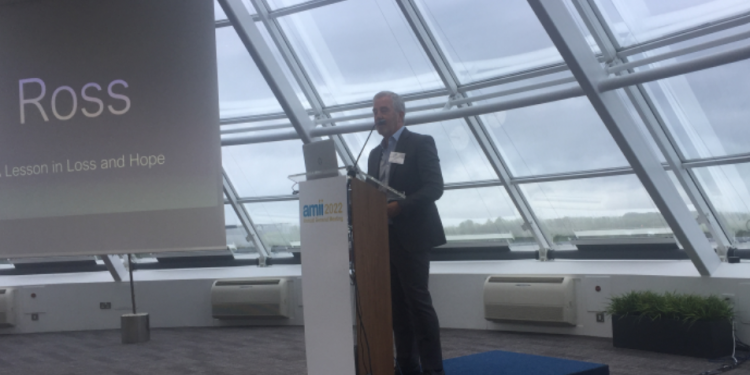All of the challenges faced over a 40 year career as a journalist covering wars, floods and disasters could not prepare Mike McCarthy for 20 February 2021 – the day which changed his life forever when his son took his own life.
As a result of that tragedy and a heart-wrenching note left by his son, McCarthy is leading a movement to increase awareness and support for mental ill health.
Addressing the Association of Medical Insurers and Intermediaries (AMII) annual general meeting this Mental Health Awareness Week, McCarthy (pictured) reflected on what he had faced during his four decades as a journalist.
He had wanted to be a journalist since the age of 11 and built-up resilience over tough days in his career.
This included 15 April 1989 when as a young BBC reporter he was sent to cover the tragic events at Sheffield Wednesday’s Hillsborough stadium where 97 Liverpool supporters attended an FA Cup semi final and never came home.
At retirement, McCarthy reflected on the good fortune he had to have his family together with his wife, three children Tom, Ross and Laura and grandson Charlie. He asked himself – how could things go wrong? But they did go wrong.
“This time all the challenges that I’d faced previously felt like nothing,” McCarthy said.
“Up until the moment I went to bed, closed my eyes on the 20 February 2021 I felt nothing could break me, nothing could shock me. But then at just after three o’clock in the morning my phone rang.
“It was my son’s fiancee who said an ambulance was at their house and it wasn’t looking good. And then I got another call a few minutes later to say Ross had died. He’d taken his own life.”
Six-month waiting list
“Obviously that changed the whole course of my life; being somebody who thought they were cruising along for a happy retirement to somebody who was debilitated by this huge tragedy,” he continued.
McCarthy described his son, who was put on a six-month waiting list for treatment when he reached out for help, as “loving, gregarious, fun-loving, friendly, kind human being” and not “other”.
“He wasn’t other. People sometimes think those who take their own lives are in some way other. He was my kid. He was your kid. He was all of our kids, brother, sister whatever,” McCarthy continued.
“He struggled for more than 10 years with his mental health and he was a warrior. He tried everything for the sake of his mental health.
“He hid it well for the sake of his family. That was the degree of his selflessness. He didn’t want to, as he saw it, inflict his pain on his family so he hid it well.”
Farewell letter pleading for help
But McCarthy revealed Ross left clear instructions on what he wanted from his dad.
“When I got myself back on my feet, I never did properly, but after a while I tried to decide which route I should take now,” McCarthy said.
“Ross left a long farewell letter in which he addressed each one of the family including his four year old son Charlie and one of the things he said to me was, ‘please fight for mental health – the support is just not there’.
“Believe me – that was all the motive that any dad could want.”
Since that point McCarthy has acted on Ross’s wishes. He subsequently discarded the idea of a foundation set up in Ross’ memory, noting that while there were many charities in this area doing great work, they failed to speak with one voice to effectively influence policy makers.
But his mental health campaigning has involved work with the Campaign Against Living Miserably (CALM), and Talk Club a mental fitness community for men, who meet online and in person at football clubs such as Sheffield United and Sheffield Wednesday.
And looking ahead to the summer of 2023, McCarthy is organising a baton of hope, developed together with other bereaved dads.
It will be taken around the UK to symbolise the voices of those who are no longer here and those in a dark place to let them know there is help and support, ending its journey at Parliament.






